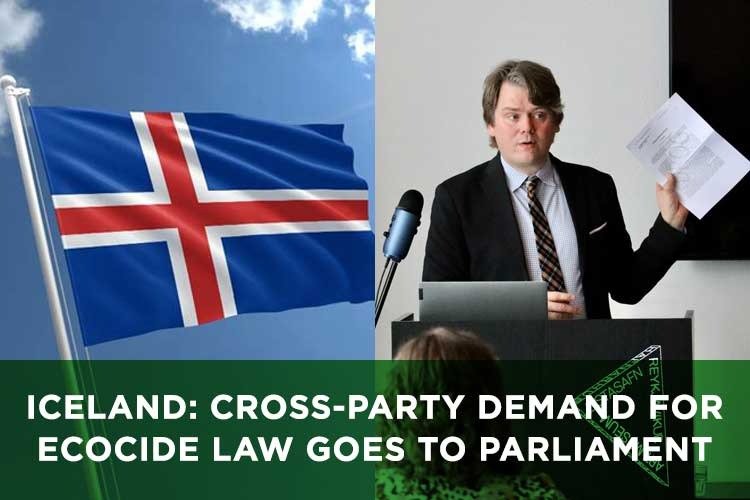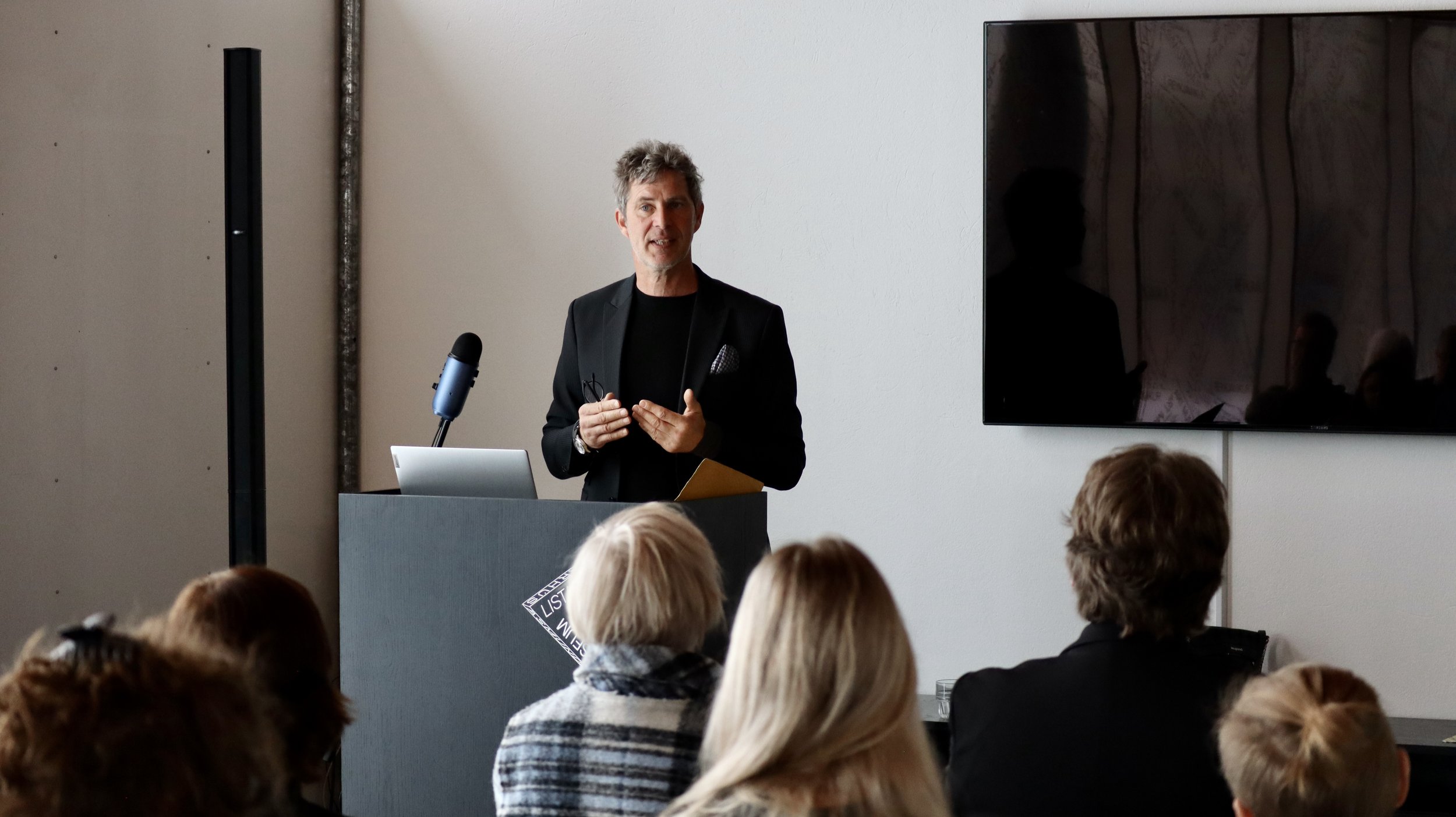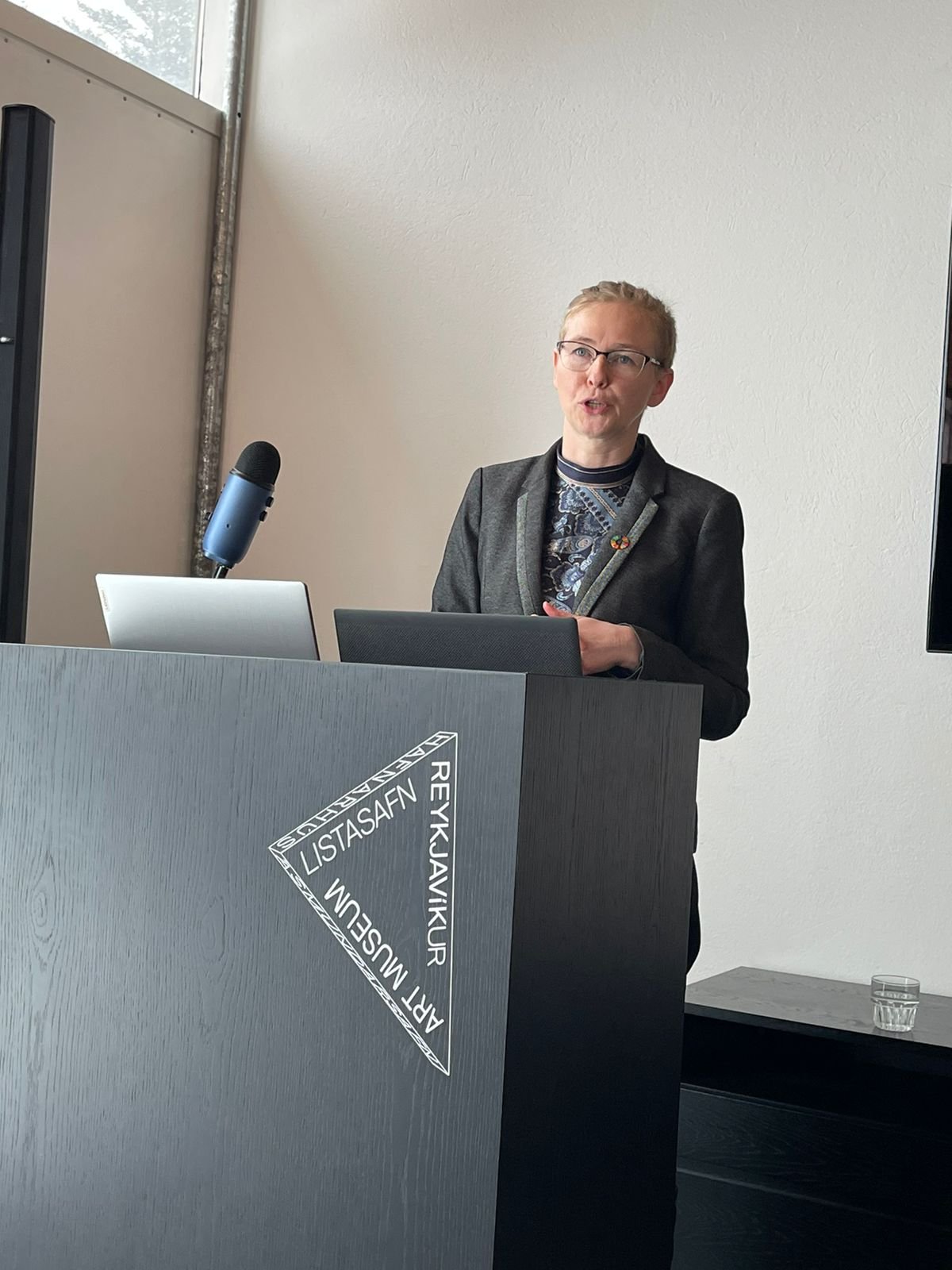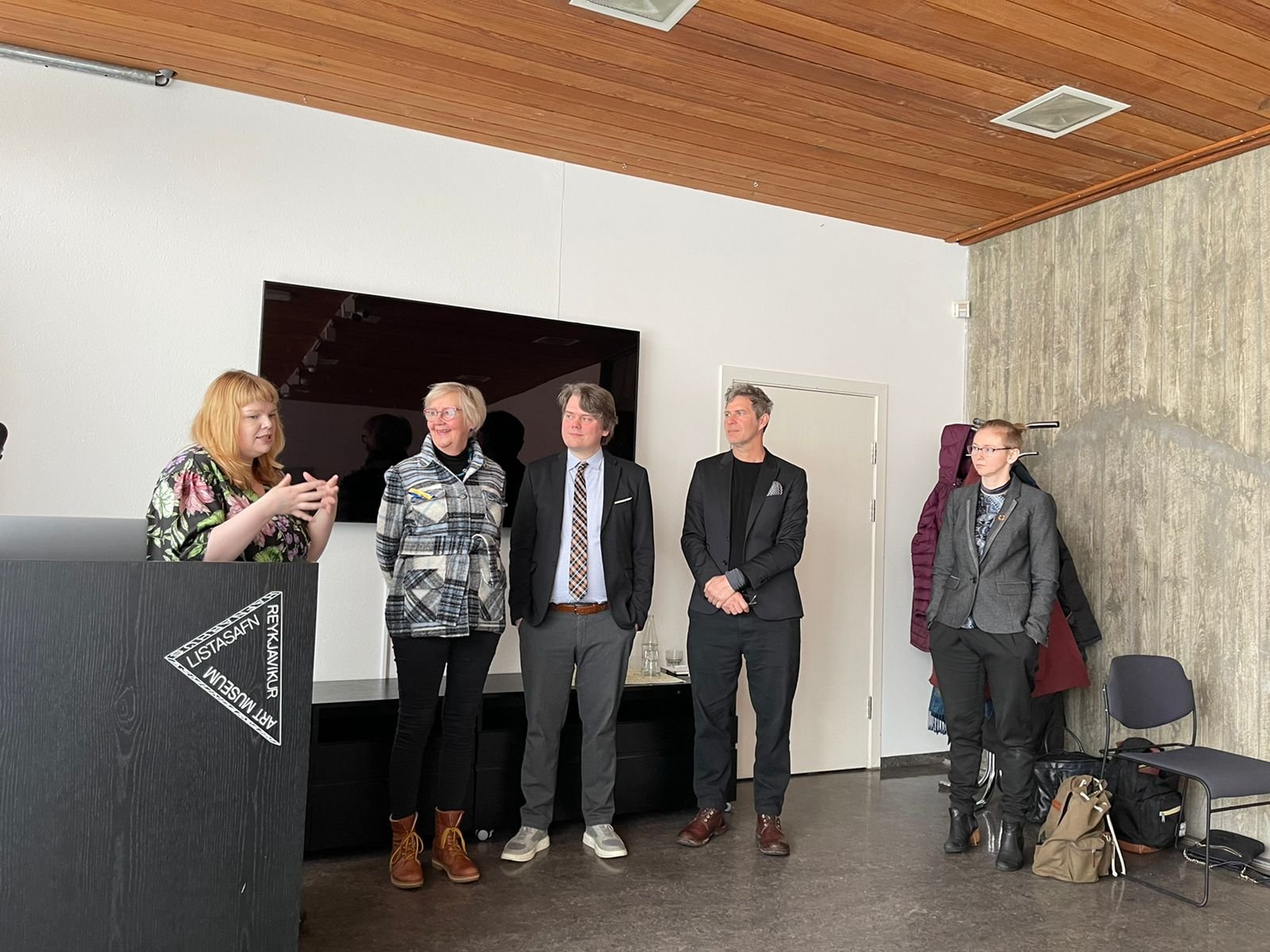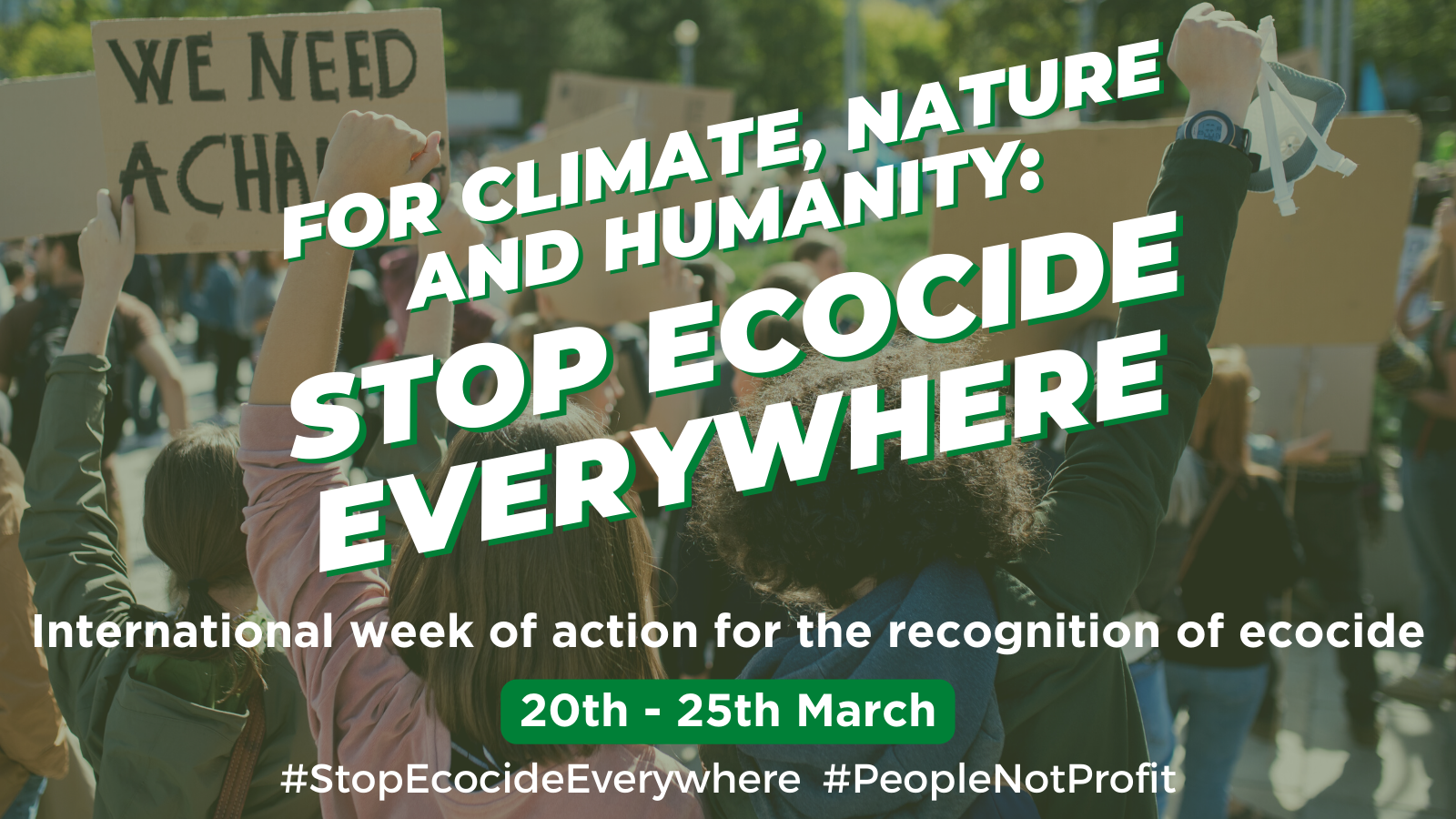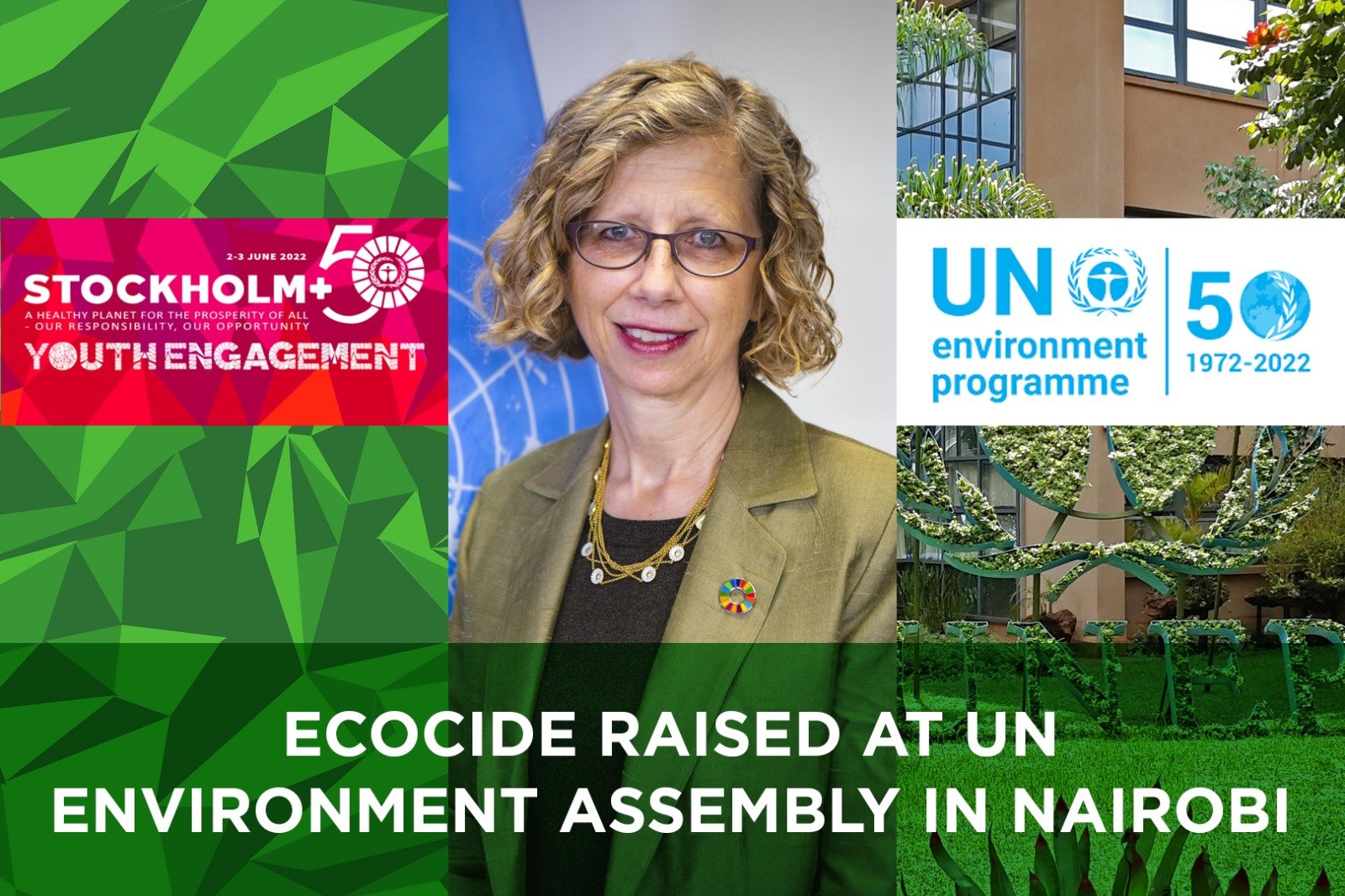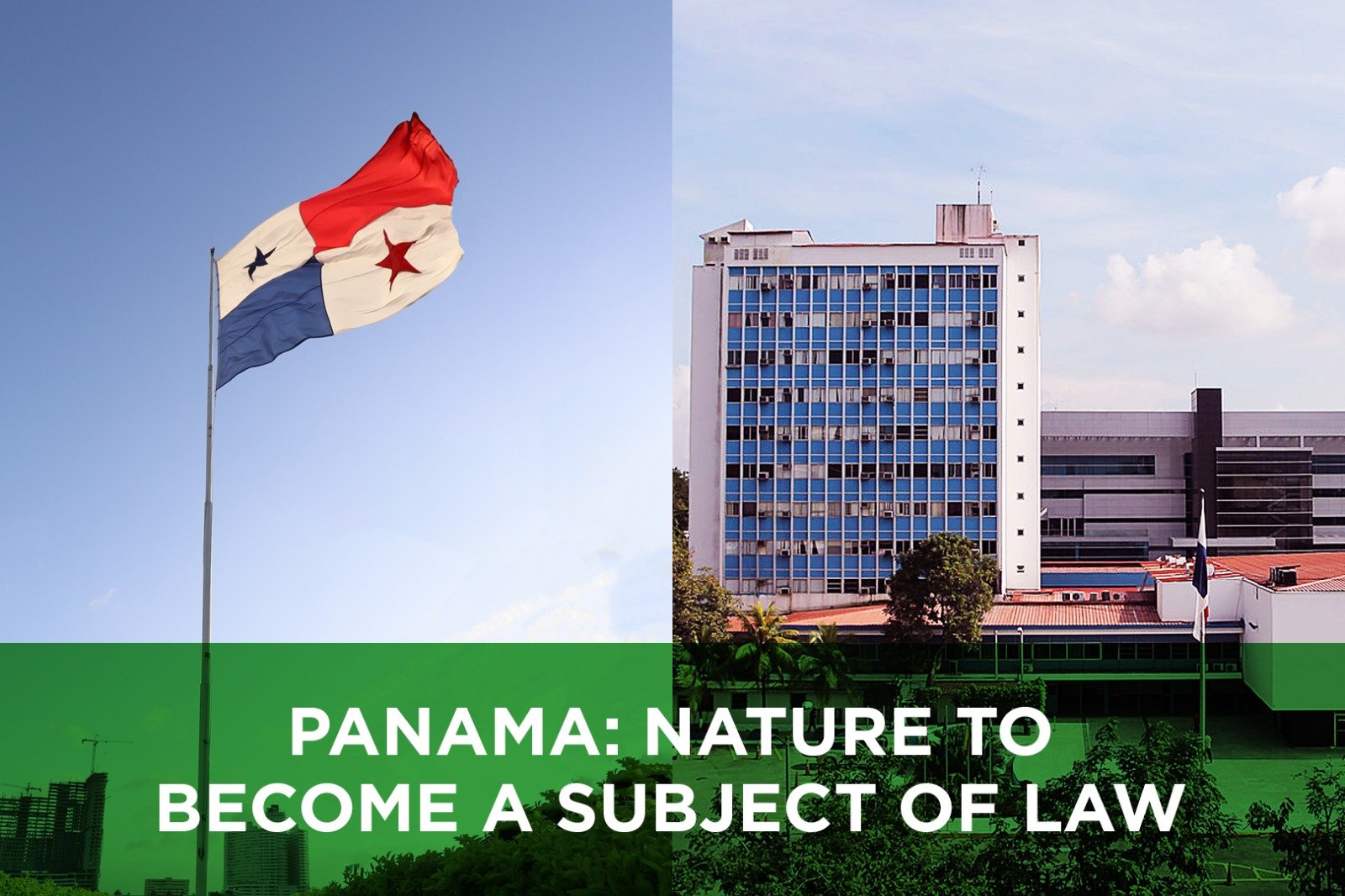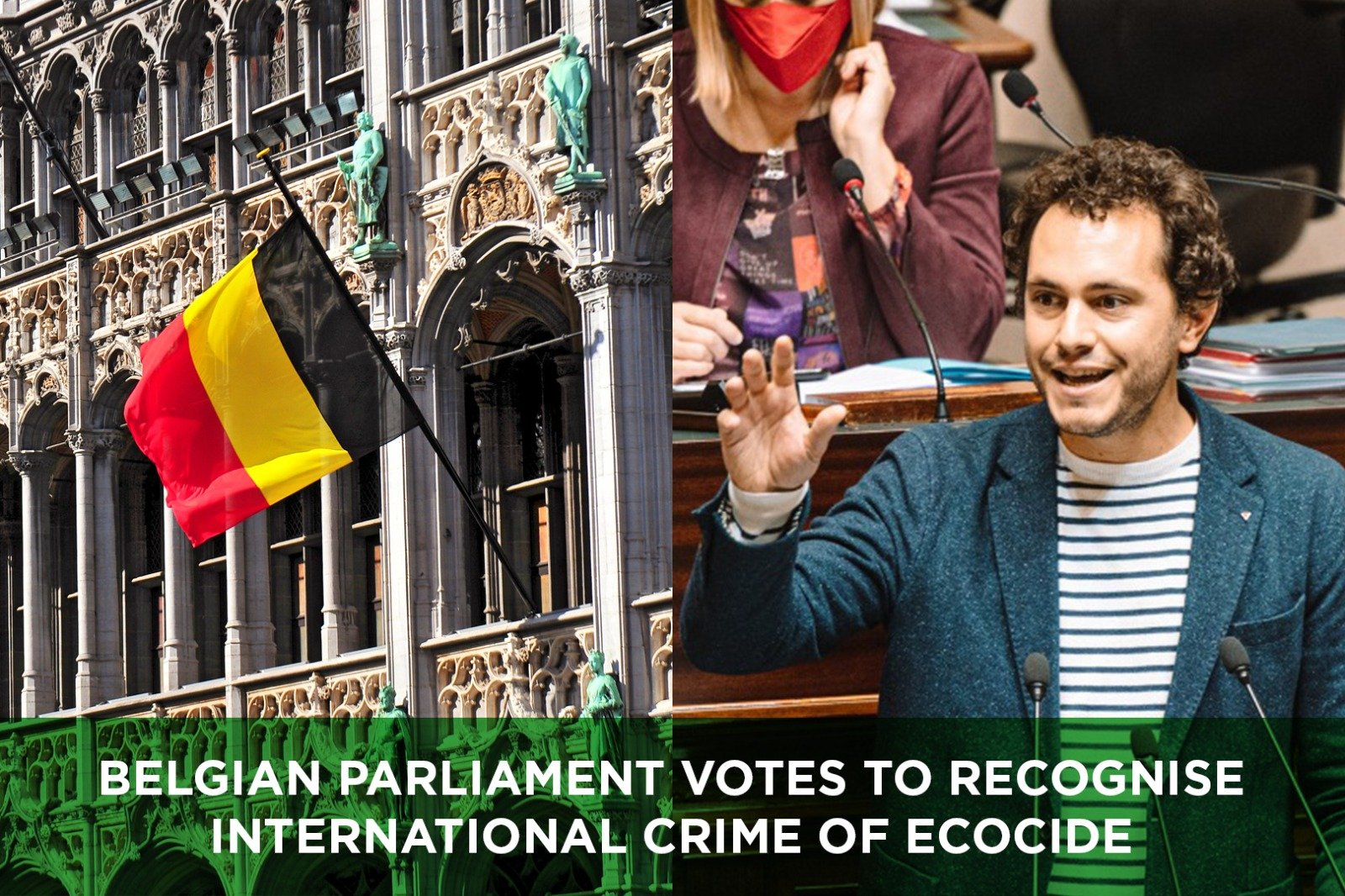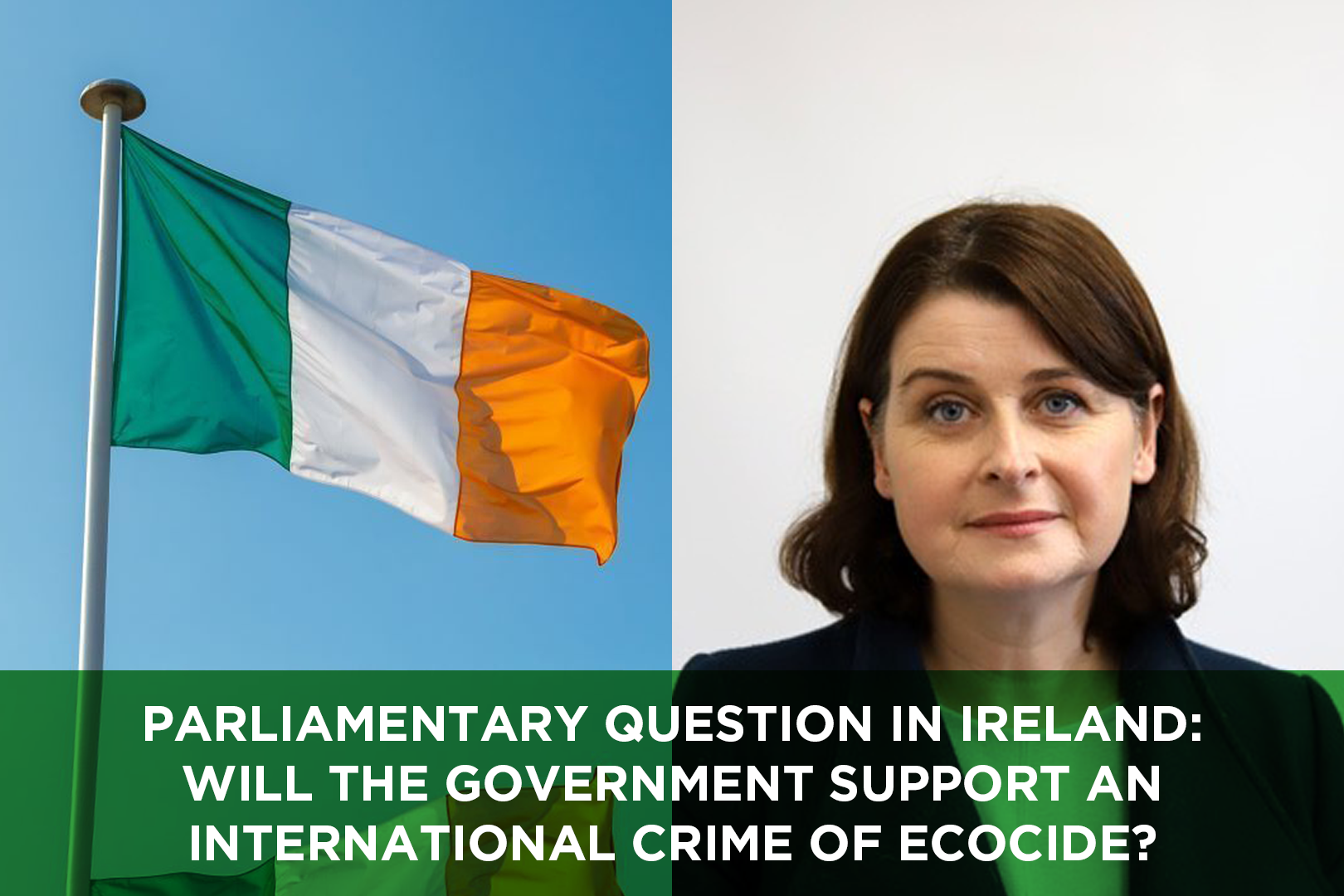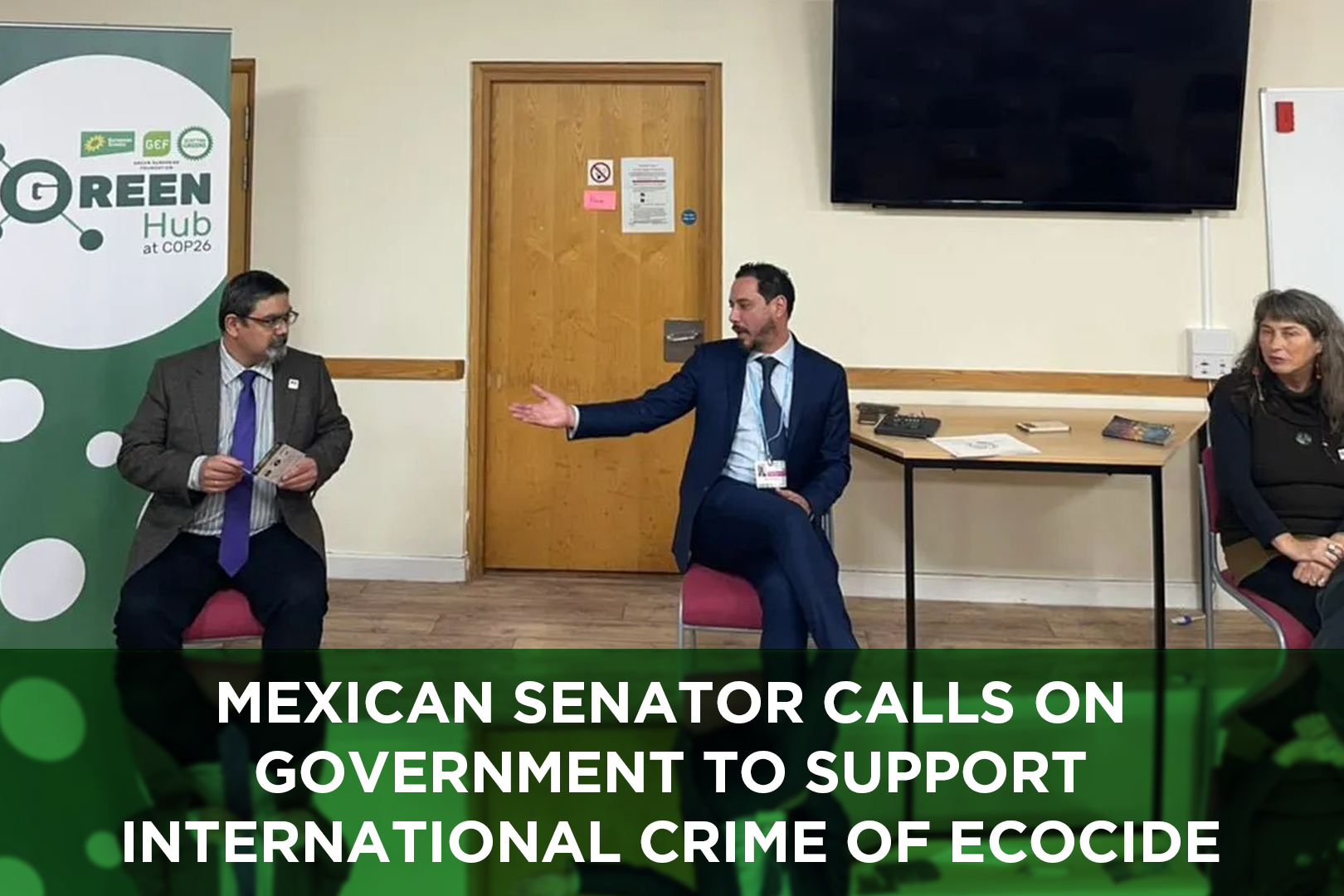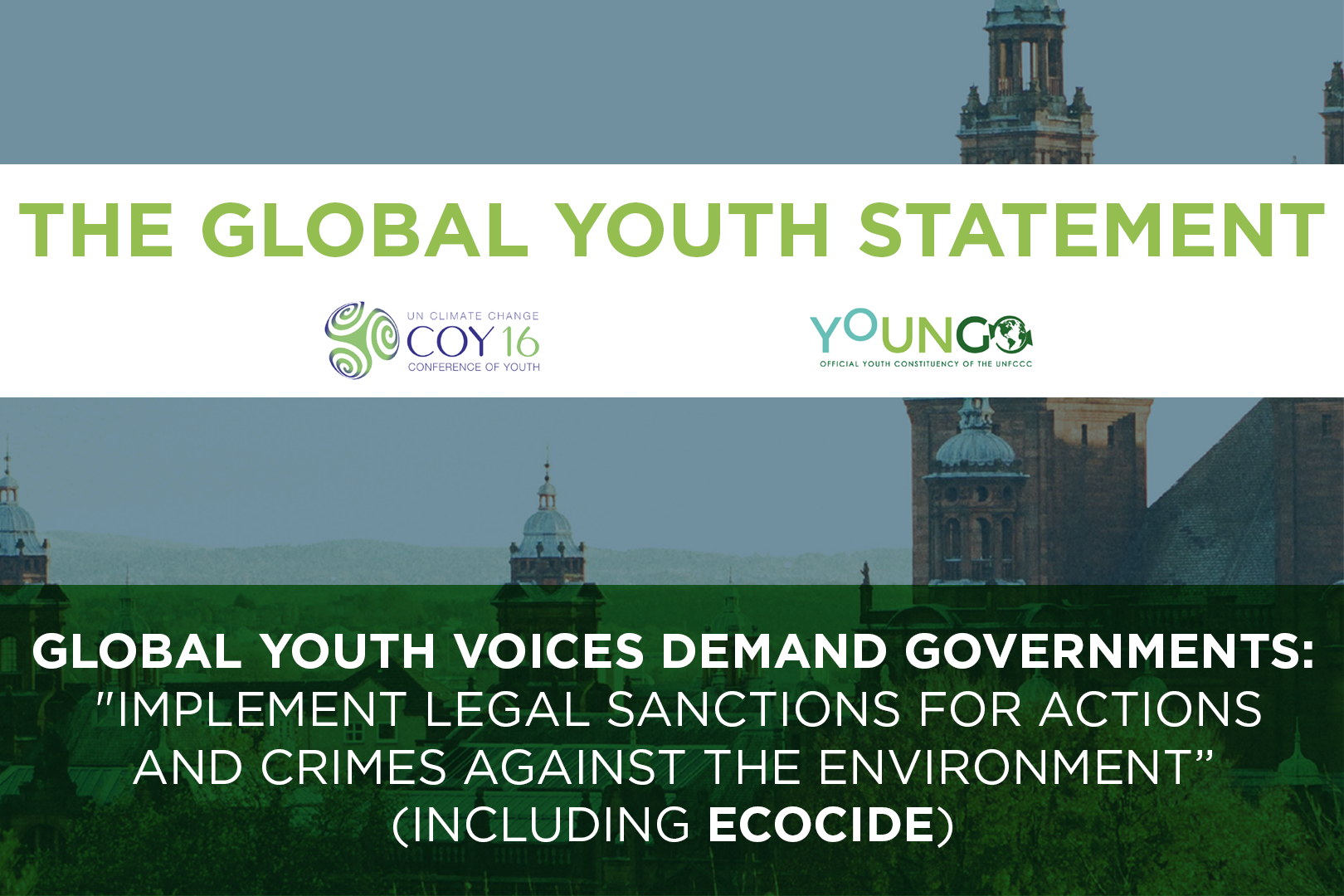International Geographic Societies call for international Ecocide Law
Jojo Mehta, Executive Director of Ecocide International, attended and spoke at the International Geographical Societies Gathering on the 30th of March.
It was an initiative of the Royal Scottish Geographical Society, hosted in collaboration with the International Geographical Union, the Royal Geographical Society and the Royal Canadian Geographical Society.
Representatives from over 30 geographical societies from across the globe were in attendance and speakers also included Elizabeth Maruma Mrema, Executive Secretary, UN Convention on Biological Diversity (full list of speakers below).
This meeting was held ahead of the COP15 in Kunming, on the UN Convention of Biological Diversity, to discuss the issues regarding biodiversity as well as exploring ways in which the community of Geographical Societies can act to address the biodiversity crisis.
In the IGSG report following the event, signing a declaration in support of the ecocide campaign was listed as a key action point. The report stated that introducing the law of Ecocide at the level of international law is ‘one of the most credible solutions to our current crisis’.
‘The shifts that are required to fulfil the framework and to support the Convention on Biological Diversity are going to be difficult if not impossible to implement in time without a suitable international criminal law framework in place’. - Jojo Mehta
The IGSG report
One of the key recommendations from final plenary:
consider signing the declaration in support of the ecocide law campaign
“Law and policy are some of the most powerful tools we have to protect life on Earth, now and in the future.
The campaign to establish a crime of ecocide, defined as the large-scale or systematic destruction of nature, at the level of international law is arguably one of the most credible solutions to our current crisis, creating a guardrail against harms where none currently exists.
Both through our organisations and as individuals, geographers everywhere can help to build support for this vital campaign, whether internationally or in our own countries.
To aid in this endeavour, we are inviting all geographical societies and institutions to add their names to a declaration of support for the ecocide law campaign, to be published jointly ahead of the next meeting of COP15.”
Speakers at the IGSG 2022:
Elizabeth Maruma Mrema,
Executive Secretary, UN Convention on Biological Diversity
Yadvinder Malhi,
Professor of Ecosystem Science, University of Oxford
Keping Ma,
Professor of Plant Ecology, Chinese Academy of Sciences
Andrés Guhl,
Professor of Geography, University of the Andes
Hindou Oumarou Ibradhim,
Coordinator, Association of Indigenous Women and Peoples of Chad
Mike Robinson,
Chief Executive, Royal Scottish Geographical Society
Joe Smith,
Executive Director, Royal Geographical Society (with IBG)
Harvey Locke,
Founder, Nature Needs Half
Paula Ehrlich,
President & CEO, E O Wilson Biodiversity Foundation; Co-Founder, Half Earth Project
Jojo Mehta,
Executive Director, Stop Ecocide International
Stockholm+50 Youth Task Force demands ecocide law
The official first draft of the Global youth policy paper S+50 (for the Stockholm+50 International UN meeting, June 2022) is now published, conducted by the S+50 Youth Task Force .The position paper was conducted by the S+50 Youth Task Force and was put together following global consultations. This paper contains a brief description of the S+50 Youth Task Force, and the 34 policies that the Task Force has put together following global consultations.
The first demand is clear:
“ 1. Provide constitutional and other legal guarantees of the right to a healthy and sustainable environment to enable victims of climate change to take polluters to court over crimes such as ecocide. More specifically, criminalizing large-scale environmental destruction by including ecocide in the Rome Statute of the International Criminal Court”.
This demand was presented to the Swedish Government, to UNEP and also during the intervention from the Global Youth at the S+50 preparatory meeting in New York. It is now clear that youth voices from all over the world call for an ecocide law and for the demands to be heard in the S+50 international meeting.
For more information, please visit the Stockholm +50 Youth Engagement web site
MEXICO: ECOCIDE INCLUDED AS A NEW CRIME IN THE STATE PENAL CODE OF JALISCO
In March, a reform to the Penal Code of the State of Jalisco was approved to include the crime of ecocide, with the vote of 36 deputies in favor. The proposal was presented by Claudia Murguía Torres (PAN), author of the reform.
The text states that whoever commits a crime of ecocide will be punished with sentences of three to ten years in prison, being defined as "the damage, destruction or loss, total or partial, vast, lasting or serious of one or more ecosystems, in a determined territory, in such a way that the enjoyment of the inhabitant species and the ecological balance is limited." “el daño, destrucción o la pérdida total o parcial, vasta, duradera o grave de uno o más ecosistemas, en un territorio determinado, de tal manera que el disfrute de las especies habitantes y el equilibrio ecológico se vea limitado.”
The article defines as vast damage when it covers at least ten hectares, lasting damage when the destruction and its impacts last at least a period of four months, and serious damage when the alteration endangers the health of people or irreparable damage to natural resources. In addition to the prison sentence, a fine of 500 to 500 thousand times the daily value of the Unit of Measurement and Actualization will be imposed.
Jalisco becomes the second State in Mexico (after Chiapas) to typify the crime of ecocide in its penal code. Although environmental crimes are already classified, the prison sentence is now increased with the inclusion of ecocide. In addition, as pointed out by Claudia Murgia Torres, the text specifies that the proceeds will be used to repair environmental damage and also establishes sanctions for public servants who, by action or omission, allow this type of conduct.
Iceland: cross-party demand for ecocide law goes to parliament
Ecocide resolution submitted to Parliament calling for support for international crime of ecocide as well as national ecocide legislation. With cross party support from Pirate Party, Liberal reformation, Social Democrats and Left Greens.
Following a conference hosted on Monday 21st March in Reykjavik, with Kristín Vala Ragnarsdóttir, earth and sustainability professor, Richard Rogers, Executive Director of Climate Counsel and former co-deputy chair of the Independent Expert Panel for the Legal Definition of Ecocide and Auður Önnu Magnúsdóttir, general manager of the Icelandic Environment Association, a Member of Parliament for the Pirate Party, Andrés Ingi Jónsson announced that:
“It's time for us to hold people accountable if nature is harmed in such a way that it threatens world peace, security and well-being. That is why I was submitting a parliamentary resolution proposing that ecocide be recognized as an international crime. It is especially good to see broad support for the issue - we are 12 MPs from four parties who are responsible for it - and hopefully Iceland can take a leading position in this fight for the rights of Mother Earth, which is in full swing all over the world."
Icelandic parliamentarians join the list of international politicians for whom the fight for ecocide to be recognized as a violation of international law is the key to protecting us and future generations.
Ecocide raised at UN Environment Assembly in Nairobi
The fast-growing call to criminalize ecocide is now beginning to be heard in the halls of the United Nations. At the resumed session of the UN’s 5th Environment Assembly in Nairobi this month (“UNEA 5.2”), it surfaced in a number of ways.
High level speeches
Two key speeches recalled the first UN Environment conference of 1972 when Prime Minister of Sweden Olof Palme first used the word ecocide to refer to serious destruction of nature, and called for it to be addressed at the international level. UNEA President, Norwegian Minister of Climate and Environment Mr. Espen Barth Eide, in his opening remarks recalled Palme speaking “about the limits to what our environment can tolerate and about the perils of ecocide.”
Inger Andersen, Executive Director of the UN Environment Programme, in her closing remarks for the special session marking UNEP@50, also quoted Palme*, remarking “I wish [his] words didn’t carry the same weight today as they did fifty years ago. But they do.” They also highlight that destruction of nature is a “crime against peace”, as the Rome Statute crimes are sometimes known.
Youth Environment Assembly
The YEA, held immediately before the main Environment Assembly, resulted in a strong call for an international crime of ecocide from the Stockholm+50 Youth Task Force. The YTF consists of 50 young people from around the world, and three global consultations have shaped the outcome of their policy paper (final version pending). The first demand made by the paper was for criminalisation of ecocide:
Provide constitutional and other legal guarantees of the right to a healthy and sustainable environment to enable victims of climate change to take polluters to court over crimes such as ecocide. More specifically, criminalizing large-scale environmental destruction by including ecocide in the Rome Statute of the International Criminal Court.
Global Major Groups & Stakeholders Forum
The Joint Statement of the GMGSF which was submitted to the Environment Assembly specifically refers to ecocide into its preamble, acknowledging that “adding ecocide as the fifth crime to the Rome Statute of the International Criminal Court would have a strong preventive effect on destructive actions.”
Call to action from UNEP@50:
In the words of Inger Andersen:
“So, as we stand here, let us all heed the words of Olof Palme, one of the giants who helped to create UNEP. Let us carry these words with us – in our minds, our hearts, our consciences. Let us take them into the world and act on them so that we can, one day soon, live together as one people, on one planet, in peace with nature and each other.”
*Olof Palme, 1972: “The immense destruction brought about by indiscriminate bombing, by large-scale use of bulldozers and herbicide is an outrage sometimes described as ecocide, which requires urgent international attention. We know that work for disarmament and peace must be viewed in a long perspective. It is of paramount importance, however, that ecological warfare cease immediately.”
Panama: nature to become a subject of law
Panama has joined Ecuador, Colombia and New Zealand, among others, as one of the leading nations which, in various ways, recognise the rights of nature. With the approval of law no. 287 Panama has signed into law the acknowledgment of nature as a subject of rights, defining nature as “a unique, indivisible and self-regulating community of living beings, elements and ecosystems interrelated to each other that sustains, contains and reproduces all beings.”
Some of the detailed rights include the “right to exist, persist and regenerate its life cycles,” the “right to conserve its biodiversity,” and the “right to be restored after being affected directly or indirectly by any human activity.”
The law mandates consideration of these rights in government policy including development programmes and promotion of them in foreign policy, making Panama a leading voice on this issue - and, we trust, paving the way for support of the criminalisation of ecocide to protect those newly assigned rights.
European parliament reaffirms support for ecocide law
With a vote on 16th February 2022 the European Parliament has once again recommended support for ecocide law. The report on human rights & democracy which was voted through last week recommends EU member states to support criminalising ecocide at the ICC & also to examine its relevance to EU law.
This is the 6th time the European Parliament has supported the ICC route and the 2nd time it has recommended an EU approach as well, indicating a normalisation of the concept and a strong basis for action going forward.
The full clause from the report resolves that the Parliament: “encourages the EU and its Member States to promote the recognition of ecocide as an international crime under the Rome Statute of the ICC, and requests that the Commission study the relevance of ecocide to EU law and EU diplomacy; calls on the EU and the Member States to take bold initiatives to fight the impunity of environmental crimes at a global level”.
Italian constitution modified to protect the environment
On 8th February 2022 the Italian parliament (Camera dei Deputati) approved proposals to adjust the constitution to protect “the environment, biodiversity and ecosystem, including in the interests of future generations”. The kinds of harm the constitution aims to protect against were expanded to include damage to “health and the environment”. Protection of animals has also been recognised. Watch the live discussion HERE.
The Minister of Ecological Transition, Roberto Cingolani described it as an “epochal day”. Media coverage HERE. The vote places Italy among leading states globally with respect to constitutional protection for the natural living world, in particular with respect to the acknowledgment of impacts on generations to come, and could pave the way to consideration of ecocide law.
Chile: ecocide included in propositions for new constitution
The constitution of Chile is currently undergoing revision, with a Constitutional Assembly charged with the addressing, drafting and compiling of the new text. It is anticipated that the new revised Constitution will be considered and adopted in June of this year.
A proposal for a “constitutional norm” regarding rights of nature and ecocide has been submitted to this process by the advocacy group Chile Sin Ecocidio and has been endorsed by 10 members of the Constitutional Assembly.
The background to the proposal states that “the crime of Ecocide should be recognised as a way to reinforce the constitutional protection of Nature, and a law will typify and penalise as a crime of Ecocide the serious, extensive or lasting damage caused to the environment.”
The proposal would have the state recognise Nature as an “active and passive subject of law” and calls for a law that “shall define and penalise the crime of Ecocide”, defined in alignment with the Independent Expert Panel (2021) as “any unlawful or wanton act perpetrated knowing or ought to know that there is a substantial likelihood that it will cause serious, extensive or lasting damage to the environment
20th session of the Assembly of States Parties (ASP) to the Rome Statute of the International Criminal Court
Our Foundation’s statement to the Assembly of States Parties and an historic event co-hosted by three of the world's most climate-vulnerable states, Vanuatu, Samoa and Bangladesh: the presentation of the legal definition of ecocide as a 5th international crime, in the context of the Assembly of States Parties to the Rome Statute of the International Criminal Court.
For a full summary, please click the image.
Belgian parliament votes to recognise international crime of ecocide
The Belgian parliament has adopted, by a strong majority, a resolution by the Ecolo-Groen parties aimed at recognising an international crime of ecocide.
By adopting this resolution, the parliament is making three demands of the Belgian government. It asks:
to "initiate a new international treaty of the most proactive countries (a 'coalition of the willing') to prosecute and prevent ecocide at the international level";
to "propose an amendment to the Rome Statute of the International Criminal Court of The Hague to include the new crime of ecocide" (in the same way as crimes against humanity); and
"to report to parliament on the upcoming expert opinion on the inclusion of the crime of 'ecocide’ in the Belgian penal code ".
The resolution was supported by the foreign affairs committee last month and has now been confirmed by this week’s plenary vote.
Proposer Samuel Cogolati is thrilled, calling it a “key day for the planet”.
This vote will encourage the government to make good on its suggestion at last year’s Assembly of State Parties of the International Criminal Court that “it would be useful to examine the possibility of introducing crimes known as ‘ecocide’ into the Rome Statute system in the context of the work of our upcoming sessions”.
Parliamentary question in Ireland: Will the government support an international crime of ecocide?
Simon Coveney, Minister of Foreign Affairs for the Republic of Ireland, was put on the spot in the Daíl by Jennifer Whitmore TD on the subject of ecocide law during parliamentary questions on 11th November.
"Will your government take a lead on this issue and actually work with [the legal drafting] panel to progress the definition of ecocide and its subsequent incorporation into the Rome Statute?" (Watch here)
The Minister declined to answer immediately but promised to return to Ms Whitmore with a fuller answer if she would write to or call him.
UK Labour Party to support criminalising ecocide
Speaking at an independent panel event on Ecocide Law and Climate Justice, hosted by Stop Ecocide International during COP26 in Glasgow (along with co-hosts Global Witness, Client Earth and Climate Counsel), Shadow Secretary of State for Justice, David Lammy MP publicly announced the commitment of the Labour Party to support discussions around an international crime of ecocide.
"I think that we should be hopeful, and this is why I am very pleased that I, as Shadow Justice Secretary, have committed the Labour Party to assisting with this cause" (David Lammy MP)
See recording at 1:22:40mins
Mexican senator calls on government to support international crime of ecocide
Speaking from Glasgow during the COP26 climate talks, Senator Raúl Paz Alonzo has asked the Mexican Government to recognise ecocide as the fifth Crime against World Peace and Security.
A few weeks ago, Senator Paz called on the Mexican Congress to recognise ecocide as as a serious crime in the federal penal code. Now, from Glasgow and in the context of COP 26, the Senator has urged the Federal Government of Mexico to be the first Latin American country to expressly support the inclusion of Ecocide in the Rome Statute of the International Criminal Court, an initiative already supported by Belgium, France, and island states such as Vanuatu and the Maldives, as well as the UN Secretary General Antonio Guterres, Pope Francis, and also the European Parliament.
From Glasgow, Senator Paz said: “I am meeting with the Stop Ecocide organisation in Glasgow to announce two things: that we are presenting in Mexico the proposal to include ecocide as a serious crime in the Federal Criminal Code and that we are calling on the Mexican State to support the international initiative to make ecocide an international crime, as Pope Francis has been pushing for. We are at a crucial moment in the history of humanity and we need measures like this to face the current climate emergency.”
If Mexico passes this law, it would be the first Latin American country to recognise ecocide, which would prevent and, if necessary, punish major environmental catastrophes that until now have been committed with impunity or only incurred an insignificant fine compared to the damage caused.
The appeal has been referred by the Senate to the Foreign Affairs Committee and the President of the Republic is expected to issue a response in the next few days. Senator Paz has also pointed out: “This has been an effort of several months and here in Glasgow, at COP26, we show that we are here to work on the changes that Mexico and the world need”.
Paz Alonzo has decided to join the Stop Ecocide initiative after witnessing, as president of the Water Resources Commission, that the country has witnessed one of the worst droughts in 20 years, and after seeing how in the same period the legal frameworks have not been updated to deal with crimes against the environment.
Last Tuesday, the Senator participated in an independent event during COP26, organised by Stop Ecocide International, which dealt with how to protect Mother Earth, from the Sacred Guardianship of indigenous peoples to Ecocide Law.
Maite Mompó, coordinator of Stop Ecocide Americas, said: “It is vital that Latin American states join the global movement to make ecocide an international crime and it is important that they also consider introducing this new crime into their own legislation. In the face of the climate and ecological crisis we are experiencing, we need to put an end to this massive destruction of nature and to do so we urgently need to introduce the crime of ecocide into the Rome Statute of the International Criminal Court. Stop Ecocide welcomes the Senator;s initiative and we have also asked that it be supported by all political groups in a non-partisan way, because protecting the environment and the future of new generations is a task to which we must all commit ourselves”.
Belgian foreign affairs committee calls for ecocide law
Belgium’s parliamentary Foreign Affairs Committee has passed a resolution submitted by Samuel Cogolati (Ecolo, Walloon green party) and Wouter De Vriendt (Groen, Flemish green party):
"calling on the Belgian government to include the crime of ecocide in the Rome Statute of the International Criminal Court, and in the Belgian Penal Code".
The resolution was passed by majority vote. It is non-binding, but gives the federal government a strong mandate to take diplomatic steps. The committee resolution will be put to the full Assembly in early December.
World’s first Global Citizens’ Assembly calls for ecocide to be enforced
The Global Citizens’ Assembly has voted that the crime of Ecocide should be enshrined in international and national laws, and that it should be firmly enforced. The Global Assembly’s declaration, which is being presented to world leaders at the COP26 Climate Conference, says Ecocide should be “firmly enforced alongside existing environmental protection laws.”
The assembly defines Ecocide as: “Unlawful or wanton acts committed with knowledge that there is a substantial likelihood of severe and either widespread or long-term damage to the environment being caused by those acts.” It could possibly make some governments, corporations and individuals guilty of an international crime.
The Global Assembly is supported by UN Secretary General António Guterres and COP26 President Alok Sharma MP. It is a new piece of infrastructure, which ensures everyday people have a seat at the global governance table. The Global Assembly consists of a Core Assembly and Community Assemblies. The Core Assembly is 100 citizens who are an accurate snapshot of the world's population by gender, age, geography, education and attitude to climate change, selected by a global lottery based on Nasa population data, meaning that anyone on earth could be chosen. Anyone in the world, can participate through running or attending a Community Assembly. All participants are supported by world class experts to understand the climate and ecological crisis.
The Global Assembly resolved to endorse the Paris agreement, which aims to limit global heating to 1.5 degrees. The assembly resolved that: “The [Paris] Agreement has to be strictly enforced and monitored by the United Nations, in collaboration with the relevant actors at all levels of governance.”
But the assembly says mitigation should be equitable. “Developed countries should assist developing countries in building up autonomous capabilities for climate action, particularly in financial and technological terms,” the declaration says.
The Global Assembly’s full declaration for action was released at an event in the COP26 Green Zone Imax Theatre at 1300 UTC on 1 November, 2021.
Global asset managers call for ecocide law
The International Corporate Governance Network, a global investor-led network whose members control over half the world’s assets under management ($59 trillion) has called on governments to collaborate internationally on criminalising ecocide.
The ICGN’s full official statement for COP26 is here. The statement acknowledges the stark and inter-related threats of climate change and biodiversity loss and states that: “Corporate boards, management, investors, the auditing profession, standard setters and others have unique responsibilities to clearly identify challenges, determine solutions, and implement assertive action.”
Amongst its recommendations, the statement urges governments to “mandate regulation and collaborate internationally to criminalise ecocide.”
A spokesperson for the network explained that “legal remedies… are viewed as part of a system of legal deterrence that can be of great value… Given the urgency of the challenges we face, [ecocide] is a concept that needs to advance.”
COY16: Global youth voices demand ecocide law
The 16th UN Climate Change Conference of Youth which took place right before COP26, brings together young delegates from all around the world and serves as a space for capacity building, networking and policy training.
One of the major outputs of COY16 is the policy document crafted by youth voices globally, the Global Youth Statement, which tackles various topics.
Under the demand "Politics and Policy making", they demand governments: "To implement legal sanctions for actions and crimes against the environment (including ecocide), especially those coming from big corporations and fossil-fuel companies."






